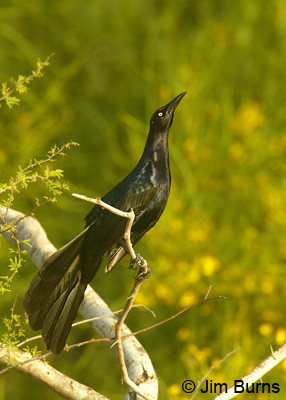
What's this got to do with birding? Be patient, I'm getting there. Right after Beck's public pity party in which he announced he had been diagnosed with macular degeneration (you know irony lives when a headline uses "Beck" and "vision" in the same breath) I chanced upon an article about biodiversity. A team of scientists from Rutgers is researching to illuminate the long suspected link between biodiversity and human disease, and birds are a key component in the study.
It has become part of conventional wisdom that biodiversity needs to be preserved because many unstudied but declining species of fauna and flora may hold the key to disease prevention. Much newer is the idea that biodiversity itself is the key to disease prevention. The Rutgers study is focused on West Nile virus, for which the main vector is birds. Here's "A," "B," and "C." Within a given habitat, a higher diversity of plant life leads to a higher diversity of bird life. A higher diversity of bird life leads, in turn, to less West Nile virus. Similar studies have connected higher plant diversity to less Lyme disease and less malaria.
The seminal work for these research projects was a 2008 publication by the Harvard Center for Health and the Global Environment titled Sustaining Life: How Human Health Depends on Biodiversity. It's not written in sciencespeak but in language accessible to the interested layman. Eric Chivian, the founder and director of the Harvard Center, labels the loss of biodiversity "Armageddon in slow motion."
Here are a few of the ideas emanating from this study: deforestation encourages the growth of more rapidly maturing fauna and flora that are less resistant to disease; mosquito species that survive deforestation are more effective carriers of West Nile; the bird species predominant in fragmented and non-native woodlots are the strongest vectors for West Nile. The article goes on to summarize the medical potential of some other endangered animal species--amphibians, bears, primates, and sharks--and concludes by stating that the biggest threat to biodiversity is global warming.
Credit Glenn Beck for being on record as saying environmentalism should be a moral imperative, not a government mandate. Temper that with his being on record as not using CFLs because he doesn't like the light they give off, his painting of global warming theorists as part of a conspiracy to subvert American values, and his criticism of the moratorium on offshore drilling after BP.
Now, let's connect three more dots. Sharks are arguably the most endangered of our ocean's animals. No one knows the effects of global warming on sharks or how many were lost to BP. Sharks are a major source of squalamine, a potential antibiotic treatment for . . . wait for it . . . macular degeneration! As I said, irony is alive and well. I wish Glenn Beck all the best with his "vision" problems.